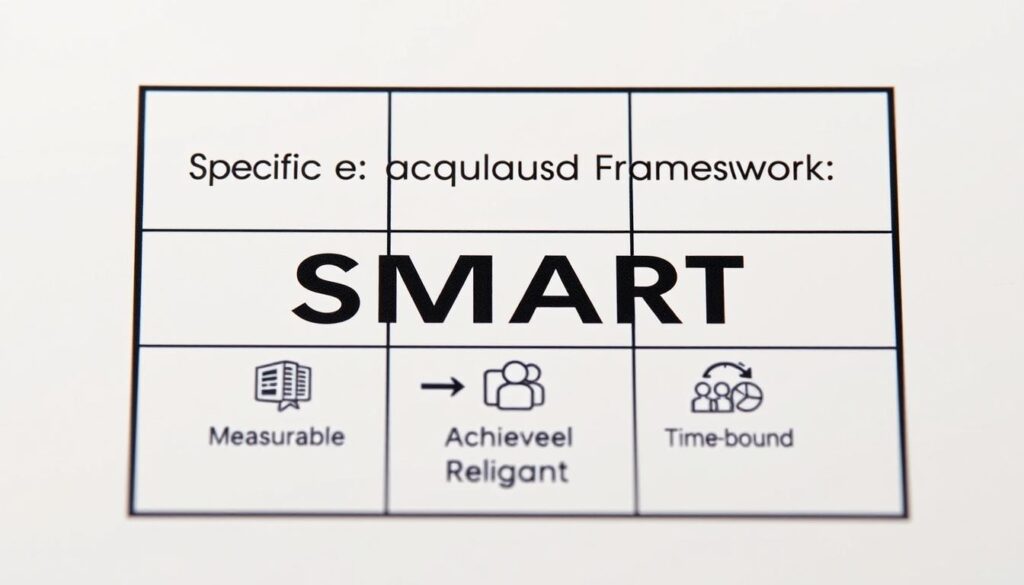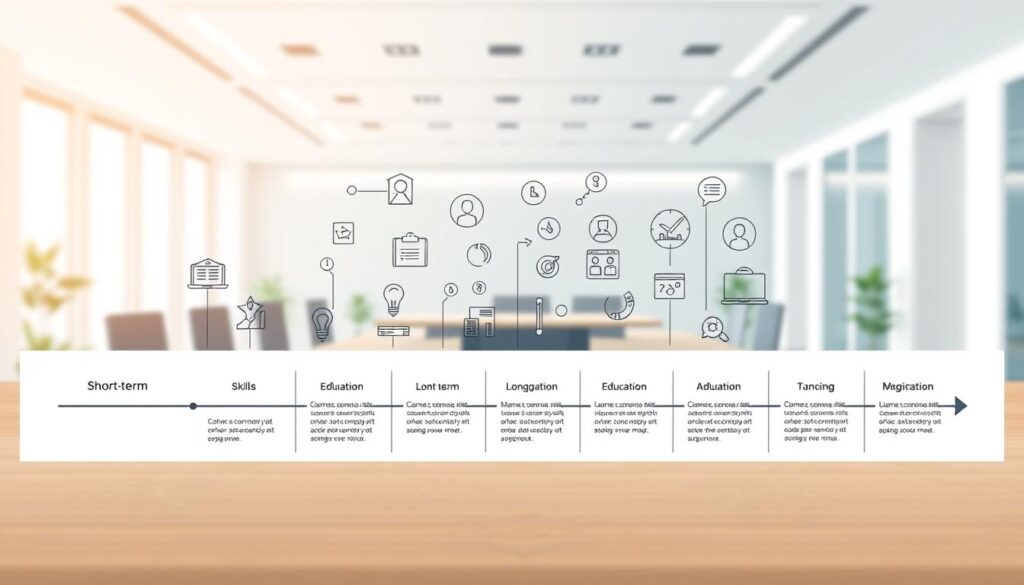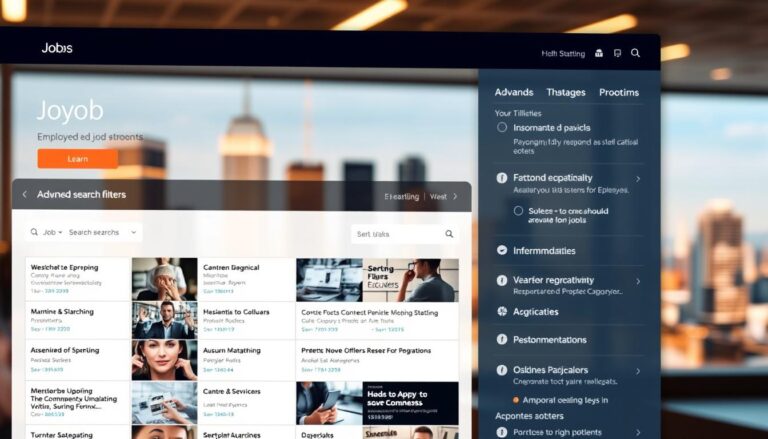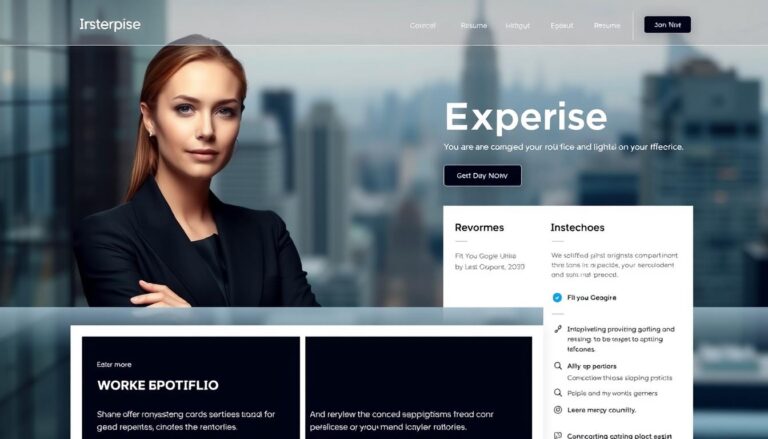Setting Career Goals You Can Actually Achieve
Professional development objectives play a crucial role in advancing one’s profession. By establishing clear targets, individuals give their work direction and purpose, enabling them to navigate their career path effectively.
Defining career objectives is essential for success. It helps individuals identify where they want to go and the steps needed to get there, making the process of achieving career goals more manageable.
This article will explore the importance of setting career goals and provide insights into creating a roadmap for professional advancement.
Why Most Career Goals Fail
Unrealistic expectations and poor planning are common reasons why career goals fail. Many people struggle to achieve their career aspirations due to a lack of clear direction and unrealistic timelines.
Research indicates that setting specific, challenging goals leads to increased performance, persistence, and motivation. However, when these goals are not aligned with a clear plan, they often result in disappointment.

The challenges of achieving career goals are multifaceted. They include inadequate tracking of progress, lack of flexibility, and failure to adapt to changing circumstances.
To overcome these challenges, it’s essential to set realistic goals that are aligned with your current situation and capabilities. By doing so, you can create a roadmap for success that is both achievable and motivating.
Setting Career Goals You Can Actually Achieve: The SMART Framework
Effective career goal setting is crucial, and the SMART framework provides a structured approach to making your goals a reality. By applying the SMART criteria, you can make your goalsspecific, measurable, achievable, relevant, and time-bound, thereby increasing your chances of success.
Making Your Goals Specific, Measurable, Achievable, Relevant, and Time-bound
To set SMART goals, start by making themspecific. Clearly define what you want to achieve in your career. For instance, instead of saying “I want to be successful,” say “I want to be a marketing manager within the next two years.” This specificity gives you a clear direction. You can find more expert tips on choosing the right career path on our website,learn how to choose theright career.
Next, make your goalsmeasurable. Quantify your objectives so you can track progress. For example, “I will increase my sales by 15% within the next 12 months” is a measurable goal. According to research, setting SMART goals can improve task performance, persistence, and motivation.

Your goals should also beachievable. Ensure that your goals are realistic based on your current skills and resources. While it’s good to be ambitious, setting unrealistic goals can lead to disappointment. For example, if you’re new to a field, becoming a CEO within a year might not be achievable.
Making your goalsrelevantis also crucial. Align your goals with your values and long-term objectives. Ask yourself, “Does achieving this goal align with my overall career aspirations?” If the answer is yes, then it’s relevant.
Finally, make your goalstime-bound. Set deadlines for achieving your goals. This creates a sense of urgency and helps you stay focused. For instance, “I will complete a certification course within the next 6 months” is a time-bound goal.
By following the SMART framework, you can create a clear roadmap for achieving your career goals. This structured approach ensures that your goals are well-defined, achievable, and aligned with your career aspirations.
Assessing Your Current Career Position
To set realistic career goals, you must first assess your current position. This involves evaluating your strengths, weaknesses, opportunities, and threats to understand where you stand in your career.
Begin by identifying your professional strengths and weaknesses. Consider your skills, experience, and areas where you excel or struggle. This self-assessment will help you understand your capabilities and areas for improvement.
Next, look at the opportunities and threats in your career environment. Opportunities might include new technologies, training programs, or emerging trends in your industry. Threats could be obstacles like competition, economic changes, or lack of resources.
By conducting this thorough assessment, you can create a clear picture of your current career position and identify the steps needed to achieve your goals. This process enables you to develop a strategic plan that leverages your strengths, addresses your weaknesses, and capitalizes on opportunities.
Crafting Short-term and Long-term Career Plans
To achieve your career goals, it’s crucial to develop both short-term career plans and long-term career plans. This involves creating a roadmap that outlines the steps you need to take to achieve your objectives.
Short-term plans typically focus on immediate needs and goals, such as completing a certification program or taking on additional responsibilities at work. These plans are essential for building momentum and laying the groundwork for long-term success.

Long-term career plans, on the other hand, involve setting broader, more ambitious goals, such as transitioning into a new field or advancing to a leadership position. These plans require a more strategic approach, including identifying key milestones and developing a timeline for achieving them.
By crafting both short-term and long-term plans, you can create a comprehensive career development strategy that guides your professional growth and helps you stay focused on your objectives.
Implementation Strategies That Drive Results
To achieve your career goals, it’s essential to put your plans into action with effective implementation strategies. This involves creating a detailed action plan, identifying potential obstacles, and tracking your progress.
Start by breaking down your long-term goals into smaller, manageable tasks. This will help you create a roadmap for achieving your objectives. For instance, if your goal is to switch careers, your action plan might include updating your resume, networking with professionals in your desired field, and acquiring new skills through online courses. You can find more resources on career development at career counseling services near you.

Identifying potential obstacles is crucial to driving results. Anticipate challenges that might hinder your progress and develop contingency plans to overcome them. For example, if you’re planning to start a new business, you might face financial constraints. In this case, you could explore alternative funding options or adjust your business plan to reduce costs.
Tracking your progress is vital to ensuring you’re on track to meet your goals. Regularly review your action plan and make adjustments as needed. Celebrate your successes and learn from your setbacks to stay motivated and focused on achieving your career goals.
By implementing these strategies, you’ll be well on your way to driving results and achieving your career aspirations. Stay committed, and you’ll see progress over time.
Tracking Progress and Overcoming Obstacles
Consistent tracking of progress and strategic overcoming of obstacles are vital to achieving your career objectives. To stay on track, it’s essential to regularly monitor your progress towards your goals.
Tracking Progress: This involves setting clear metrics and benchmarks to measure your advancement. By doing so, you can identify areas where you’re succeeding and areas that need improvement.
Overcoming Obstacles: Challenges are inevitable, but with a strategic approach, you can overcome them. This includes identifying potential obstacles, developing contingency plans, and staying flexible to adjust your plans as needed.
By combining consistent progress tracking with effective obstacle overcoming strategies, you can stay focused on your career goals and make steady progress towards achieving them.
Conclusion
Achieving your career goals requires a clear plan, a willingness to take action, and a commitment to tracking your progress. By following the steps outlined in this article, you can set yourself up for success and achieve your career objectives.
Setting career goals is just the first step; career development is a continuous process. It involves regularly assessing your current position, crafting new plans, and implementing strategies that drive results. By doing so, you’ll be well on your way to achieving your career goals.
Effective career development is about making progress, overcoming obstacles, and staying focused on your objectives. With persistence and dedication, you can achieve your career goals and enjoy a fulfilling professional life. By applying the principles outlined in this article, you’ll be better equipped to navigate your career path and achieve success in your chosen field.






